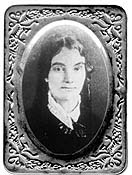 On March 22, 1877, the Wisconsin legislature passed a bill that prohibited denying a person admission to the state bar on the basis of sex. The bill was in no small part due to the efforts of Lavinia Goodell, the first woman admitted to the state bar in Wisconsin.
On March 22, 1877, the Wisconsin legislature passed a bill that prohibited denying a person admission to the state bar on the basis of sex. The bill was in no small part due to the efforts of Lavinia Goodell, the first woman admitted to the state bar in Wisconsin.
Goodell was born in New York in 1839 and moved to Janesville in 1871 when she was 32 years old. Goodell was interested in the law, but no law firm would take her on as an apprentice, which was a common path to becoming a lawyer in the 19th century. So she studied law on her own. Her dedication to law apparently won over Pliny Norcross, a partner in the Janesville firm of Norcross and Jackson and eventually Goodell worked there before striking out on her own. Norcross was instrumental in helping Goodell gain admission to the Rock County bar in 1874. Goodell initially did collections work, but then began to make a successful career out of doing work for women’s temperance groups.
It wasn’t until Goodell needed to appeal a case to the Wisconsin Supreme Court that her gender became an issue. According to the Wisconsin Historical Society, at that time it was customary for the Wisconsin Supreme Court to allow any lawyer admitted to any circuit court bar to practice before it. Not so for Lavinia Goodell.
In 1876, Wisconsin Supreme Court unanimously and unequivocally denied her motion to appear before that court. (In re Goodell, 39 Wis. 232 (1876)).

